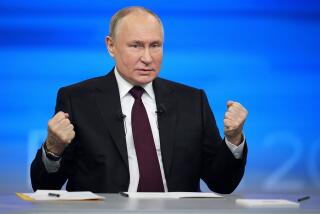Crisis Plan Unveiled in Russia
- Share via
MOSCOW — After seven weeks of intense speculation and debate, Russia’s new prime minister unveiled a vague and contradictory economic crisis plan Saturday that amounts to a tactical retreat from market reforms.
Prime Minister Yevgeny M. Primakov said he will try to pull Russia’s economy out of its nose dive with measures including some price controls, state support for industry and increased regulation of financial flows.
But he insisted that his country will not revert to a Soviet-style economy.
“There is no doubt that the market economy will be retained and developed,” Primakov told a news conference. “But especially as we try to find a way out of this crisis, it is necessary to take all possible measures to regulate [the economy]. Hence the need to strengthen the regulatory role of the state.”
International Monetary Fund negotiators left Moscow last week without agreeing to release a $4.3-billion loan installment.
The Interfax news agency said the team reviewed the crisis plan and considered it “a significant step backward in forming a market economy.”
Primakov responded to the IMF criticism with defiance, saying Russia will not accept financial help at the price of its national pride.
“If we get [IMF] support, it will be easier for us to get on our feet,” he said. “But if we don’t get support, we won’t go down on our knees.”
Ruble Devaluation Kicked Off Crisis
Russia’s economic crisis was triggered Aug. 17 when the government--long struggling to pay workers and creditors--was forced to, in effect, devalue the ruble and to default on foreign debt. Since then, prices have soared 45%, bank accounts have been frozen and social discontent is on the rise.
The economic crisis set off a political crisis: President Boris N. Yeltsin fired Prime Minister Sergei V. Kiriyenko and launched a confrontation with parliament that ended with Primakov’s taking over Sept. 11 as a compromise figure.
The crisis plan has been Primakov’s priority, but he has struggled to reach consensus among the diverse politicians in his Cabinet, which includes Communists and economic liberals.
As a result, the plan is a hodgepodge of concepts, long on goals but short on specifics. And it fails to resolve the country’s central dilemma: how to pursue socially popular policies such as price controls and higher wages while still meeting IMF demands for fiscal discipline and market reforms.
Several of Primakov’s statements reflected that conundrum.
“Foodstuffs will have a market price,” he told reporters. However, “costs of some products will be regulated to make them affordable for the population.”
Primakov said the full text of the plan will be finalized and released later this week, but he described the main measures as:
* Reducing corporate profit taxes from 35% to 30%, which will spur domestic production by an estimated $3 billion.
* Keeping inflation to 5% a month this year and no more than 30% for next year as a whole. Primakov did not say how this would be done.
* Imposing price controls on medicines and “essential foods” and pursuing a “softer” social policy. Primakov did not elaborate, but aides said wage and pension hikes are likely.
* Printing some money to cover the government’s debts but keeping it to “minimal” levels.
* Keeping the ruble a freely floating currency and rebuilding Central Bank reserves.
* Reasserting control over the finances of industries partially owned by the state in an effort to raise budget revenue.
* Offering foreign creditors a debt swap and rebuilding the collapsed banking system at the same time. Creditors holding defaulted government treasury bills could exchange them for unspecified securities, which would then be invested in various Russian banks. It was not clear whether those securities will be shares or a form of capital.
Crisis Plan Draws Sharp Criticism
The proposals drew swift and sharp criticism from analysts and politicians.
“The parts of the program I’ve seen so far cause me serious misgivings,” Kiriyenko said. “The economy has been prescribed a sedative and a laxative at the same time. That won’t work.”
Mikhail Leontyev, a banking analyst and anchor of a financial news program on the TV-Tsentr network, called the debt swap plan an “insult.”
“Investors are not idiots,” he said. “No one in their right mind would accept this offer.”
Even Grigory A. Yavlinsky, the liberal lawmaker who first promoted Primakov for the job, struggled to contain his dismay.
“A whole series of goals have been outlined that we consider positive. The problem is achieving them,” he said.
Vladimir I. Shcherbakov, a former Communist who is co-chairman of the Russian Business Round Table, said Primakov is being disingenuous about the goal of his policies.
“It would be stupid to expect the government to announce it is planning to stop market reforms and end the market economy in Russia,” he said. “No Russian politician has the guts to do this because they know such a statement would cause an explosion of tremendous anger both in Russia and abroad.”
More to Read
Sign up for Essential California
The most important California stories and recommendations in your inbox every morning.
You may occasionally receive promotional content from the Los Angeles Times.













